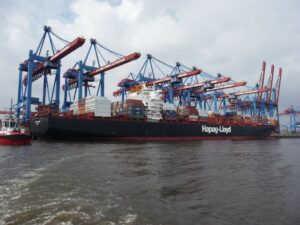By Marek Grzybowski
Maritime transport has recently experienced great turmoil. The new mutations of the coronavirus pandemic and the sanctions imposed on Russia after that country invaded Ukraine have caused disruptions in global logistics. Congestion at the last mile in a port, logistics center or container terminal causes global turmoil in leading industrial markets, both on the supply and demand side.
The world’s merchant ship fleet reached a capacity of around 2.3 billion dwt in January 2023. This is about 60 million dwt more than a year earlier and over 120 million dwt than in January 2021. Tonnage has increased significantly in all segments except general cargo operators in the last two years.
Bulk carriers recorded a particularly rapid increase in overall carrying capacity. The share of bulk carriers in the total capacity increased from 41 to 43 percent, the share of tankers decreased from 30 to 29 percent, and the share of general cargo ships from 5 to 4 percent. in the years 2012-2022.
Over 500 LNG tankers transported liquefied gas across the oceans in 2021. About 650 LNG tankers transported LNG on sea routes in 2022. By the end of 2023, their number will increase to about 690 LNG tankers.
Quantum technology for the logistics industry
What can a forward-thinking organization do with the current state of technology? – asks Dr. Christopher Savoie, CEO of Zapata Computing in Forbs and answers: “It’s best to start with making the most of this technology.”
“We’re seeing a steady evolution of quantum hardware, which is becoming increasingly fault-tolerant, and existing technology is slowly becoming more widely available,” said CEO Zapata Computing.
“Quantum technology is an exciting development for the logistics industry as it allows us to solve the recurring problem of finding the most efficient route between multiple hubs, which is becoming increasingly difficult in a complex environment,” said Justin Baird, Head of Innovation, DHL, Asia-Pacific Center. DHL portal.
Logistics in storms need support
Turmoil in sea and land logistics networks will require the support of efficient tools. These include the already widespread use of IoT and the management of ship and car fleets, traffic control in ports, on railroads and on rivers.
The smallest yacht or even a boat moving on inland waterways is supported by satellite technologies.
No one can imagine the movement of ships, cars and even couriers without the support of satellite technologies. Tracking a package purchased in a store by an individual customer is already a standard. It can therefore be expected that according to the predictions of IBM and DHL and the services introduced by UPS, quantum algorithms will enter global and local logistics at a rapid pace.
If large and small ports, terminals and logistics centers, sea and land connections are to participate in the logistics networks of the global economy, then we must be prepared to introduce innovative solutions based on quantum, information and space technologies today. Otherwise, we risk marginalization or even falling out of the market.
Sources: Forbs, Zapata Computing, IBM, DHL, UPS
